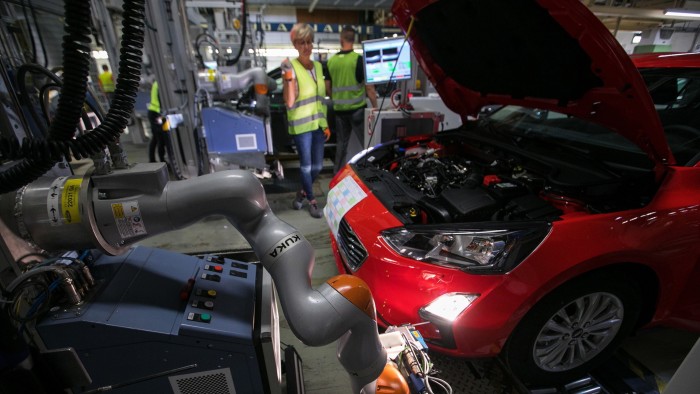Unlock the Editor’s Digest for free
Roula Khalaf, Editor of the FT, selects her favourite stories in this weekly newsletter.
Ford plans to cut about 4,000 jobs in Europe as the carmaker grapples with slowing demand for electric vehicles and fierce competition with Chinese rivals.
The US company on Wednesday said the cuts would be in place by the end of 2027 and would affect 2,900 jobs in Germany and 800 in the UK, representing about 14 per cent of its 28,000 workforce in Europe.
Ford’s two UK sites, Dagenham and Halewood, and its plant in Valencia, Spain, would not be affected. But officials said the cuts would involve administrative roles as well as jobs related to petrol engine production.
Dave Johnston, Ford’s European vice-president, said that despite the job losses, the company remained committed to the region. “It is critical to take difficult but decisive action to ensure Ford’s future competitiveness in Europe,” he said.
The moves are pending discussions with trade unions and governments. “We reject this massive job cut,” said Benjamin Gruschka, head of Ford’s works council. “Ever further staff cuts are not a sustainable business strategy.”
The global automotive industry has come under intense pressure to close plants and reduce headcount in Europe and elsewhere amid slowing growth in EV sales and fierce price competition with Chinese rivals.
Volkswagen, Europe’s largest carmaker, also plans to shut at least three German plants and axe tens of thousands of jobs owing to a sharp loss of market share in China and sluggish vehicle demand in Europe.
Ford has struggled in Europe, where it has been posting losses and cutting jobs for years. To address slowing demand, the company has reduced the number of vehicles in its line-up to focus on more profitable areas of the highly competitive market.
Peter Godsell, vice-president of Ford in Europe and international markets group, said he could not rule out further restructuring steps, blaming “unprecedented” regulatory and economic headwinds.
“We need to find a way of being here with a business that is viable and profitable moving forward,” he added.
Ford early last year said it would reduce 3,800 jobs in Europe, including 1,300 in the UK.
Jim Farley, its chief executive, has also warned in the past that the production of electric cars would require 40 per cent fewer workers than vehicles powered by internal combustion engines.
Ford also said it would cut production for its new Explorer, an electric sport utility vehicle developed and built in Germany, and its electric Capri that would result in even more shorter working hours at its Cologne plant. The company has invested $2bn to transform the plant to produce EVs.
The industry headwinds have also increased on the back of tougher emissions rules in the UK and on the continent. Sales of electric vehicles in key markets such as Germany have fallen significantly in recent months after governments suddenly pulled back or reduced subsidies for EV purchases.
Ford’s chief financial officer John Lawler recently issued a statement to the German government, calling on it to do more to improve market conditions and to provide flexibility to meet the emissions targets.
“What we lack in Europe and Germany is an unmistakable, clear policy agenda to advance e-mobility,” Lawler said in the letter.
Earlier on Wednesday, workers at Volkswagen said they were prepared to forfeit €1.5bn in future pay rises, if executives at the German company agree to rein in bonuses, curtail dividends and cancel plans to close factories.
In a joint press conference, union IG Metall’s chief negotiator Thorsten Gröger and VW works council chief Daniela Cavallo, proposed that a previously demanded 7 per cent wage rise go into a “solidarity fund” to support wages during periods of short-term hour reductions.
The proposed package — the first concession in the increasingly tense stand-off between VW workers and managers — would mean executives giving up parts of their bonuses over the next two years, as well as a “contribution through the dividend policy”.
If VW executives would not agree to scrap plans to close at least three factories in Germany, IG Metall’s Gröger said, they should prepare for “an industrial dispute unlike anything the country has seen in decades”. Potential strikes at VW’s German sites would be possible from December 1.
Read the full article here




